Analysis of childish drawing
Today I want to dedicate myself to making an educational post about the stages of children's drawing so important for parents and teachers for drawing is a basic form of expression in every person. This topic is fundamental to be able to observe the relationships that the infant is entering with his surroundings. With the drawing we can evaluate how their development is both cognitive and affective, understanding that the boy or girl will be acquiring new structures that allow him to understand and represent the world. And observe how the infant is linked effectively with their parents and / or caregivers.
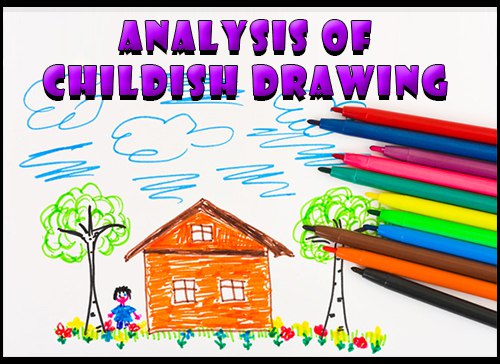
Edited Source
The theory of Viktor Lowenfeld is used as a reference and analysis will be made from a collection of drawings in ages between 2 and 9 years, which were made for drawing practice of my evolutionary development class that had the permission of the parents of each infant. Of course, I will work with the initials of the children for the protection of the identities of the children.
Scribbling stage from 2 to 4 years.
In this stage the infant's first encounter with the drawing occurs, this is done without intention. It is constituted of the following sub-steps:
Scribbling uncontrolled: There is no organization in the strokes, some can be curved or straight, but no specific address. There is no manual oculus presence and neither does it possess developed motor skills.
Controlled scribbling: has better control of movements, experiments with different types of strokes such, as circular, horizontal or vertical, they can also make use of various colors.
Scribbling with name: This keeps a controlled scribbling but, demonstrates intentionality in the drawing. With the acquisition of speech, you can now assign a name to your strokes.
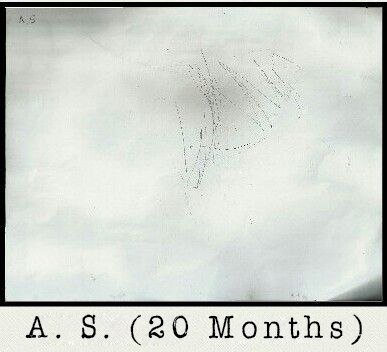
The scribbling stage has a presence according to Lowenfeld at 18-20 months first in a disorderly manner, in the case of the drawing of an infant with the initials A.S of 20 months the scribbling is present in an orderly manner, it manages to make the lines in only one direction. repeated form, there is no intentionality to represent this we can observe by noting the gaze of the infant that was sometimes not aimed at drawing, for the infant is a moment of discovery, exploration and enjoyment.
Although some parents and caregivers may not give importance to the doodle, this is an important step for the infant not only to see the psychomotor development, but also how the infant is treated at this stage will have a negative or positive impact in its later stage. For example, if a child is punished for making wall strokes, it is possible that when he is in his initial education stage, he does not want to perform tasks. It is advisable to create a space for the child to draw.
Pre-schematic stage from 4 to 7 years
The infant's motor skills already allow him to make drawings more like reality. At this stage it is common for the adult to differentiate the drawing.
As many have seen in children's drawings, representations that are given the name of “monigote", sticks sketch or tadpole. These drawings are typical of this stage, this occurs according to Lowenfeld and Brittain (1980) because the child will represent what he can recognize of himself because he still has an egocentric vision of the world.
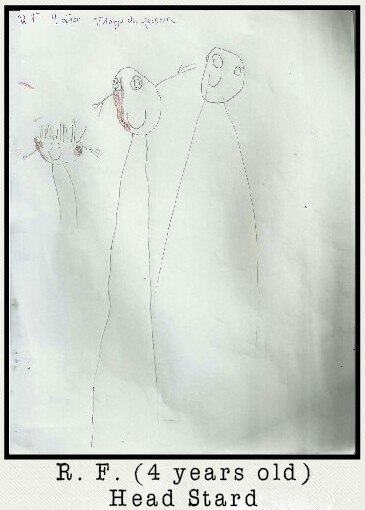
The pre-schematic stage can be observed in the child of initials R.F of 4 years. It shows an intentionality and already presents different schemes of reality and is able to name it, as was the case with this child who said: "I'm going to draw a furry baby. Although with a clear reduction of the image to the most important or significant parts for the child. This stage, says Lowenfeld, is the beginning of graphic communication.
At this stage, the infant can better communicate what it wants, since it already controls body movements better, making the human figure recognizable. The 4-year-old infant not only says "I'm going to draw the hairy baby" but he makes a human figure with long hair, smaller in relation to the other figures that the infant said were his parents. Here begins the symbolization of the objects of the world. Although this will do so in the form of “monigote”, sticks sketch or tadpoles where highlights only the head; with eyes and mouth, and his arms and legs lengthened.
Although in the first drawing the infant did not use the colors, at this stage the children do not use the colors of reality as seen in the drawing of it is common the use of favorite colors or bright or clear colors for happy situations or opaque colors sad situations. Although it also depends on the stimulation received by the boy or girl, because in the case of the infant V.M he pointed out that he would paint his mother in black because she was black and he did so.
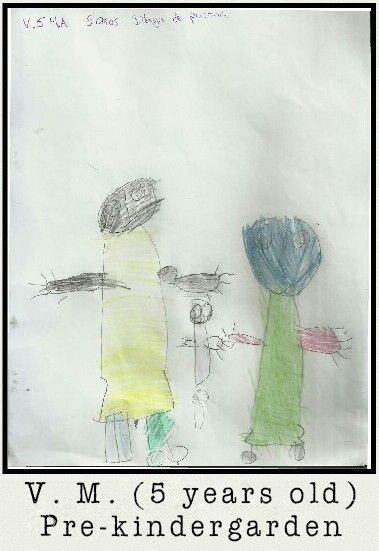
Schematic stage from 7 to 9 years
The scheme according to Lowenfeld and Brittain (1980) is the
concept to which a child has come in relation to a real object. Being the scheme a defined concept that forms the child with respect to the objects, figures and people that make up the environment that surround it, this scheme influences the wealth or poverty of the experiences with the environment that is around them. However, it is worth noting that a repeated scheme and a stereotype is not the same, since the first one is flexible presenting variations, while the second one is always the same.
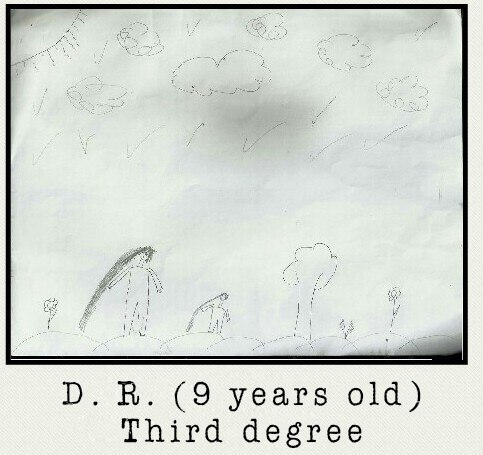
The themes chosen by the girl D.R used it both in the drawing of the human figure and in the free drawing, as is the case of trees, clouds, sun and mountain. There is a presence of symmetry. We see different perspectives within a graphic representation as it was in the human figure.
The human figure presents itself with a neck. The objects were placed in a baseline, although not rigid, in this case it is rather a mountain as a base, therefore they are semicircular lines. The colors were not chosen arbitrarily are appropriate to nature. Still no presence of details in the different shades, still using basic colors.
At this stage it may happen that the infant, because of his desire to represent everything he knows, makes use of transparency; drawing even what is hidden, as for example, there are children who draw human figures with clothes and in him the sexual organs are seen, this is not a reason to be alarmed, the child demonstrates everything he is knowing about the world and wants it represent.
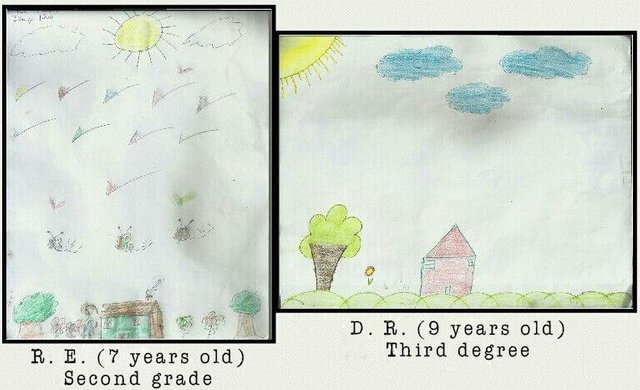
Something very important to keep in mind, that was part of the reflection in class, is the use of stereotypes, we observe that many of the drawings in this stage are similar, they draw, for example, the house, the tree and the sun. In younger children there is a diversity of representations and this diminishes in later stages and seems to be linked to the school, in which the creativity of the child is not sought, and the creative process of the child is limited.
Although the cases mentioned here are related to a particular reality. Lowenfeld's theory can be applied to the analysis of the drawing and my intention with that post was to show you how you can do through these examples. I hope this can be a good contribution for the community. No more to add I say goodbye We're reading!
Congratulations! This post has been upvoted from the communal account, @minnowsupport, by ninibeth from the Minnow Support Project. It's a witness project run by aggroed, ausbitbank, teamsteem, theprophet0, someguy123, neoxian, followbtcnews, and netuoso. The goal is to help Steemit grow by supporting Minnows. Please find us at the Peace, Abundance, and Liberty Network (PALnet) Discord Channel. It's a completely public and open space to all members of the Steemit community who voluntarily choose to be there.
If you would like to delegate to the Minnow Support Project you can do so by clicking on the following links: 50SP, 100SP, 250SP, 500SP, 1000SP, 5000SP.
Be sure to leave at least 50SP undelegated on your account.
I was summoned by @ninibeth. I have done their bidding and now I will vanish...
A portion of the proceeds from your bid was used in support of youarehope and tarc.
Abuse Policy
Rules
How to use Sneaky Ninja
How it works
Victim of grumpycat?
This post has received a 0.35 % upvote from @booster thanks to: @silverdevil214.